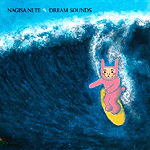|
|
 |
Dusted Reviews
Artist: Nagisa Ni te Album: Dream Sounds Label: Jagjaguwar Review date: May. 1, 2005 |

|
|
|
 |
It may appear paradoxical, but for all the fragility of Nagisa Ni te’s music, written and mostly performed by Osaka-based couple Shinji Shibayama and Masako Takeda, their songs are unyielding things, even though they may often end on an ambivalent note - a coda that spins 180 degrees from the song’s body, or an imperfect peal of feedback. However, given the proliferation of recordings and re-recordings dotted through Nagisa Ni te’s career (they’ve already been compiled, on Songs for A Single Moment, and released a live acoustic set, Tai yo no sekai), Shibayama and Takeda don’t mess with structure. A song is a song is a song.
On Dream Sounds, the duo re-records a small clutch of their older work. For some of us, there can be no end to the rendition: it’s impossible to tire of the song-as-endless-horizon that is “True Sun,” where an aqueous introduction and several lengthy, slowly unraveling verses are broken up by Neil Young-style guitar exegesis. Nevertheless, Shibayama and Takeda are caught in a bind of their own design: writing songs that are melodically simple yet structurally complex, they do not allow much space for negotiation, short of complete overhaul. Yet the unyielding nature of Nagisa Ni te’s music makes it hard to imagine exactly how the duo could articulate complete re-hauls of their work that maintain the original’s spirit while sending the songs spiraling off their axis.
Years spent at the coalface have sharpened performance and delivery, with Takeda in particular sounding more assured. The acid burn of guest guitarist Naoki Zushi’s sheet-noise flare-outs spike Nagisa Ni te’s languorous songs: his solos are deceptively simple, wrangling myriad shades from a tiny handful of notes. The ending of “Me, on the Beach” is swamped with airy mellotron, a fair trade-in for the loss of the original’s melancholy acoustic guitar coda. And there’s a psychedelic weight to certain parts of “True Sun” that suggests Shibayama has, again, been toiling away at the record collection, engaging in heavy listening to early Rain Parade records. Ultimately, Dream Sounds is as good a reminder as any of Shibayama’s and Takeda’s unwavering devotion to capturing discrete moments in everyday life, and their desire to rhapsodize and eulogize their relationship in song. That this is never gauche or trite is testament to the strength of their musical a(r)mour.
By Jon Dale
|







